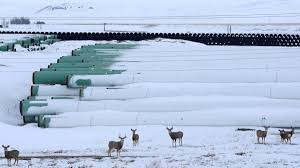
On July 6, two court decisions breathed new life into the 50 year old National Environmental Protection Act (NEPA), 42 U.S.C. § 4321 et seq.; and, in one case, supported a broad interpretation of the Endangered Species Act. The decisions involved controversial and long-fought battles, in court and on the land, against the Keystone XL and the Dakota Access Pipelines. Both turned on whether the U.S. Army Corps of Engineers properly issued permits for construction; both courts found they had not, and both halted construction.
IMAGE: REUTERS/Terray Sylvester
“Judge Morris ruled that the government failed to consider the pipeline’s impact on endangered species in issuing permits, thereby violating the Endangered Species Act. He cited the importance of a thorough assessment of potential harm to endangered species, finding that it outweighed the interests of the government and corporations in continuing construction.”
These rulings follow Sunday’s unexpected announcement by two energy companies behind the Atlantic Coast Pipeline that they were throwing in the towel. They abandoned the 6-year, $8B, 600-mile project, part of which would have run under the Appalachian Trail, due to cost and regulatory uncertainty. Of note, the announcement came only weeks after the U.S. Supreme Court ruled in favor of the project.
- Dakota Access Pipeline case: The Standing Rock Sioux and the Cheyenne River Sioux Tribes sued to prevent the pipeline from being constructed under a lake that borders North and South Dakota, because of the potential for environmental disasters. In ruling in favor of the tribes, who argued that the government had not performed necessary environmental reviews required by NEPA before giving the green light to begin construction, the Honorable James E. Boasberg, U.S. district judge for the D.C. District began his opinion: “American Indian Tribes on nearby reservations have sought for several years to invalidate federal permits allowing the Dakota Access Pipeline to carry oil under the lake. Today they finally achieve that goal — at least for the time being.” Importantly, after balancing the harm to both sides, ruled: “The Court will nonetheless require the oil to stop flowing and the pipeline to be emptied within 30 days from the date of this Opinion.” Read Judge Boasberg’s opinion.
- The Keystone XL Pipeline faced a similar hurdle with similar results several months ago, and yesterday, the US Supreme Court left in place a lower court ruling halting construction of the Keystone pending further government review. In a May order, Judge Morris of the Montana District Court, ruled that the government failed to consider the pipeline’s impact on endangered species in issuing permits, thereby violating the Endangered Species Act. He cited the importance of a thorough assessment of potential harm to endangered species, finding that it outweighed the interests of the government and corporations in continuing construction. Read the opinion here.
We expect appeals in both the Dakota Access and Keystone cases. So does Judge Boasberg when he said that the oil would stop flowing “at least for the time being.” But it’s been a good couple of days.
